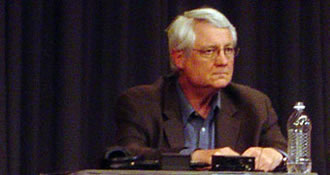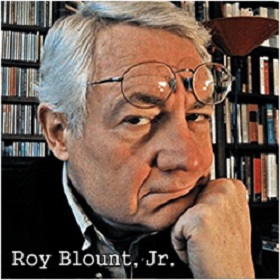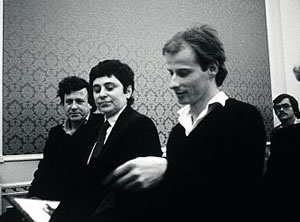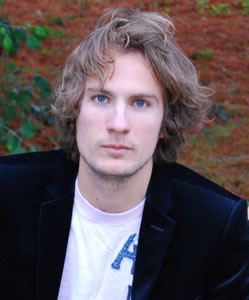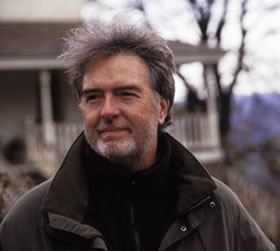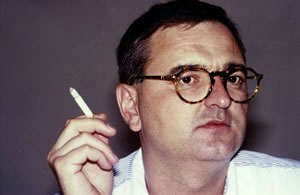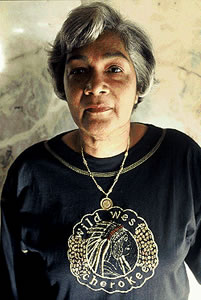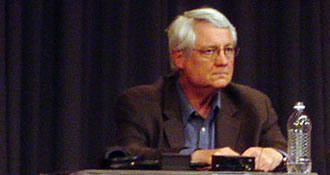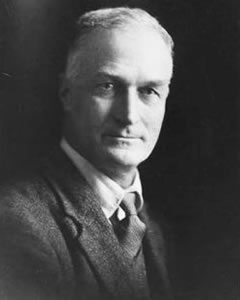De Nederlandse schrijver Oek de Jong werd geboren in Breda op 4 oktober 1952. Zie ook mijn blog van 4 oktober 2007 en ook mijn blog van 4 oktober 2008.
Uit: Brief aan een jonge Atlas
„Vriend, je schijnt de Verzengde Luchtstreek te naderen. Wat een gloedvolle brief. Met name de laatste bladzijde is vrijwel onleesbaar. Viel het licht in de hotelkamer uit? Heb je die golvende zinnen in duisternis geschreven? Waarom kon je niet op het daglicht wachten? Met veel geduld heb ik dat Arabische handschrift bestudeerd. Nu eens leek die laatste bladzijde me een visioen, dan weer verward geklets. Hoe het ook zij: ik maak me zorgen.
Dat het lijden je heeft aangetrokken sedert je aan loszittende melktandjes wrikte – dat wist ik. Dat seksualiteit voor jou, ondanks alle affaires, vooral een zaak van de geest is – dat zie ik in je schilderijen. Dat je bij het schrijven van brieven graag verschillende talen dooreen gebruikt en de spraakkunst naar je hand zet – daaraan was ik gewend geraakt. Maar dit, deze regel: bind mij op uw altaar. Zo lees ik in je hanepoten. Bind mij op uw altaar en tref mij met een zonnesteek.
Neem me niet kwalijk, maar waarschijnlijk is de zon je al in je kop geslagen, voordat je, daar in Zagora, de rand van de woestijn bereikte.
Je beschrijvingen van Marokko stemmen me weemoedig. De medina’s. Die geur van stof, zweet en rottend fruit ruik ik tijdens de heetste zomerdagen ook wel eens op de Dappermarkt. Je torst de hitte als een loden mantel. Daar doe je het toch voor? Sommige moskeeën zijn toegankelijk – geld!
In de moskeeën breng je de heetste uren van de dag het prettigste door. Het lawaai van de stad verdwijnt, nadat je je schoenen hebt achtergelaten bij de zwakzinnig geworden bedelaars in de poort. Koel en schoon marmer. Je wast hoofd en handen bij het fonteintje op de binnenplaats. Liggend op de rieten matten onder de arcades, volg je de zwaluwen, die langs de gewelven scheren. Je luistert naar het reutelen van het water, naar het gemummel van oude mannen, en je zet het mes in de meloen.
De eindeloze busritten vind jij dus ook het beste onderdeel van de reis. En je hebt dezelfde fout gemaakt als ik: water drinken in de bus. Zodra je daar mee begint, krijg je steeds meer dorst en zit je na enkele uren als een klotsende waterzak in die hobbelende bus. Kijk naar de edele Berbers. Urenlang bewegen zij zich niet. Overigens bestaat er voor je dromerigheid in de bussen een simpele verklaring. Dromerigheid ontstaat door het onophoudelijk waarnemen van voorbijglijdende dingen. Als bij het staren naar het water van een rivier. De geest raakt in verstrooiing. Wonderlijk is het dat juist daar, in het vage, in de monotonie, dikwijls ideeën ontstaan.“

Oek de Jong (Breda, 4 oktober 1952)
De Nederlandse schrijver en dichter Willem Jan Otten werd geboren in Amsterdam op 4 oktober 1951. Otten schrijft poëzie, verhalend proza, toneel, kritieken, artikelen, beschouwingen en essays. Hij groeide op in de Amsterdamse Rivierenbuurt en in Laren (NH). In 1973 debuteerde hij als dichter met de bundel Een zwaluw vol zaagsel. Van 1989 tot 1996 was hij redacteur van Tirade. Na het verschijnen van zijn roman Ons mankeert niets in 1994 raakte Otten betrokken in de discussie over het euthanasie-vraagstuk. Naar aanleiding van zijn bekering tot het katholieke geloof (enige tijd nadat zijn echtgenote hetzelfde had gedaan) publiceerde hij in 1999 Het wonder van de losse olifan
ten, een rede tot de ontwikkelden onder de verachters van de christelijke religie. In 2004 verscheen zijn roman Specht en zoon die op 2 mei 2005 bekroond werd met de Libris Literatuur Prijs. In deze roman vertelt Willem Jan Otten het verhaal van portretschilder Felix Vincent die van de rijke industrieel Valéry Specht de opdracht krijgt zijn gestorven zoon te schilderen.
De winter uit
Je hebt op schoot
een baby, van de buren,
niet van ons.
Is het gebeurd
wat ik vanmorgen
heb bespeurd?
Het bad liep vol
vanmorgen vroeg.
Ik dorst te weten dat
wat jij als een gedicht
nog net verzweeg:
ze is er weer,
bij ons, bij ons.
Ik hield mijn mond.
Het bad liep vol
vanmorgen vroeg.
Jij neuriede.
Daarop gorgelden
de graven leeg.
Je hebt op schoot
de babybuur, plons plons
en ach, hou nu mijn mond.
Korte toespraak tot mijn zonen wanneer zij op kamers gaan wonen
Zonen, tweemaal heb ik heel de mensheid voortgebracht zien zijn.
Allebei de keren kwam zij naakt en kledder voort uit Von,
hangend aan haar poten als gestroopt als een konijn
tussen duim en vingers van een stoïcijn die haar een lel
verkocht en zij bleek jullie, telkens één, een dubbelklappend,
krijtend, alles vergend dier met, wisten wij meteen, een ziel.
Er is een ja dat alle nee omvaamt en in zich draagt,
het is gekreten voor je weet wat krijten is, het klinkt als nee,
maar krijt van ja, het is, jawel, het is als alle amens samen,
de laatste zucht is het te baren door he
t onuitsprekelijkst gebed.
We hebben ja gezegd, ons eerste naakte amen was er eerder zelfs
dan onze naam, en steevast zal de kwestie zijn: waar hebben wij
ons ja vandaan, wie heeft ons opgescheept met meer dan wij?
Vraag waar je mee begonnen bent, vrees in de weeënstorm
van zeker nee, wanneer je alles weet wat zeker wordt geweten,
vrees daar je ja en zeg haar nieuw geboren en ten einde na.
Willem Jan Otten (Amsterdam, 4 oktober 1951)
De Oostenrijkse schrijver Gabriel Loidolt werd geboren op 4 oktober 1953 in Eibiswald. Hij studeerde electrotechniek en filologie in in München en Graz. Na jarenlang gewerkt te hebben als lector aan een universiteit in het buitenland werd hij actief in verschillende culturele verengingen. In 1988 debuteerde hij met de roman Der Leuchtturm. Sinds enkele jaren is hij zelfstandig schrijver.
Uit: Yakuza
„Als ich von der Zeitung aufsah, um meinen Augen eine Pause zu gönnen, bemerkte ich eine Frau, die mit halb suchenden, halb irrenden Blicken zwischen die runden Marmortische in meine Richtung schlenderte. Ich war versucht, ihren zögerlichen Weg zu verfolgen, um zu sehen, wen sie wohl ansprechen würde, denn mir war nicht entgangen, dass sie eine kalte Zigarette zwischen den Fingern hielt. Verbat mir das jedoch bald. Das Kapitel Frauenbekanntschaften hatte ich längst abgehakt, und die Frau hätte meine Tochter sein können.
Zu meiner Verwunderung tauchte sie an meinem Tisch auf, beugte sich, die Zigarette vor ihre Lippen haltend, zu mir herab und sagte in bestem Deutsch, aber mit slawischem Akzent: – Verzeihung, ich habe gehört, Sie sind ein Meister Ihres Fachs. Könnten Sie sich vorstellen, Ihre Kunst auch mir angedeihen zu lassen?
Obwohl die Frage harmlos, ja fast peinlich logisch war, bedachte man meinen Beruf, hatte ich für Momente ein Gefühl, das ich bald als lächerlich abtat: Mir schien, diese Frau könne mein Leben, das seit vielen Jahren in der schönen Sinnlosigkeit meiner Kunst verrann, in eine bestimmte Richtung treiben und mich, dessen einziges Verdienst wohl nur die Unbescholtenheit war, obwohl ich einmal die Gelegenheit gehabt hatte, straflos zum Henker, nein, Mörder, zu werden, am Ende ins Gefängnis bringen.
Ich legte die Zeitung auf dem Tisch ab, ohne die Pfeife aus dem Mund zu nehmen, und griff nach den Streichhölzern: Der Flammenschein holte ein Gesicht aus dem Halbdunkel, das auch im Winter den Teint von Honig beibehalten würde, und es war eine Haut, wie sie Weiße selten haben – der großzügige Ausschnitt ließ keinen Zweifel offen.
Die Frau bedankte sich und nahm mir gegenüber Platz. Alles an ihr, das herbstgrüne Kostüm, die Uhr, das Armband die Perlenkette, wirkte teuer, zum Teil sogar protzig, sodass ich sie, wäre sie mir in einer Hotelbar begegnet, vielleicht mit einer bestimmten Sorte Frau verwechselt hätte. Gleichzeitig war sie immerhin so schön, dass ich sogar aus den Augenwinkeln merkte, wie die Gäste, vornehmlich Studenten ohne Geldsorgen und deren weibliche Begleitung, tuschelten.”
Gabriel Loidolt (Eibiswald, 4 oktober 1953)
De Franse dichter en schrijver Matthieu Gosztola werd geboren op 4 oktober 1981 in Mans (Sarthe). Hij studeerde piano en compositie, literatuur en menswetenschappen. In 2007 kreeg hij voor zijn essay Sur la musicalité du vide de Prix des découvreurs als jongste schrijver die deze prijs ooit in ontvangst mocht nemen. Zijn gedichten werden gepubliceerd in diverse literaire tijdschriften en bloemlezingen. Ook werkt hij als criticus voor Histoires Littéraires en als fotograaf.
aujourd’hui
Une fille a posé son sourire
Sur une épaule
Sur mon épaule
est-ce qu’on hérite notre sourire
de quelqu’un
Je n’ai pas pu m’abstenir de suivre Lydé
le bouton de la chemise de nuit
comme obstacle du désir
Quand je me suis déshabillé
Des ombres
de son corps et de l’arbre
Les coqs riaient déjà.
*
Sarajevo
le bleu d’azur du ciel
Une balle qui se perd
Dans le corps d’un enfant
Il tombe
la couleur du cinabre sur le sol
Il n’a pas eu le temps de tomber amoureux
Il est resté enfant
c’est peut-être préférable
Il n’a pas eu à chercher chez tous les êtres
Le regard d’une fille rencontrée par hasard
Et puis laissée dans le cours de la vie
Comme l’eau
qui goutte du robinet
Matthieu Gosztola (Mans, 4 oktober 1981)
De Surinaamse schrijfster Cynthia Henri Mc Leod werd geboren op 4 oktober 1936 in Paramaribo als Cynthia Ferrier. Zie ook mijn blog van 4 oktober 2006 en ook mijn blog van 4 oktober 2008.
Uit: Herinneringen aan Mariënburg
“Lila Gobardhan-Rambocus
De bij Vaco aan de Domineestraat uitgegeven roman Herinneringen aan Mariënburg
beschrijft de levensgeschiedenis van Sita. Zij werd geboren als oudste dochter van Susila Sahaldeo. Susila was beslist geen gewone koeliemeid: in haar eigen land behoorde ze tot een schatrijke familie. Haar vader was grootgrondbezitter, de belangrijkste man in een dorp niet ver van Bombay in het voormalige Brits-Indië. In 1888 kwam Susila naar Suriname en werd tewerkgesteld in het huis van de directeur van de suikeronderneming Mariënburg. Deze directeur, de Schot Mavor, begon een buitenechtelijke verhouding met haar en hieruit werden twee dochters geboren. In 1902 werd Mavor vermoord tijdens een opstand op de plantage als gevolg van de zoveelste loonsverlaging. De opstand werd bloedig onderdrukt: er vielen rond de twintig doden, de lijken werden op een geheimgehouden plek in een massagraf gedeponeerd tussen twee lagen ongebluste kalk.
Susila werd na de dood van Mavor als kindermeisje tewerkgesteld op plantage Peperpot. Haar kinderen werden haar afgenomen en werden ondergebracht in een weeshuis van de r.-k.-missie. Het jongste meisje Damayanti werd geadopteerd door een echtpaar dat kort daarop naar Engeland terugkeerde. Sita bleef bij de nonnen tot ze op eigen benen kon staan.
Net als haar moeder kreeg Sita een relatie met haar werkgever, die twee (buitenechtelijke) kinderen bij haar verwekte. Na de dood van deze werkgever trouwde Sita met een creoolse oppasser en ze ging terug naar Mariënburg toen haar man daar een baan aangeboden kreeg. Op Mariënburg hoorde ze hoe het de plantage verging en dat er van tijd tot tijd allerlei onverklaarbare ongelukken gebeurden. De bevolking fluisterde dat het te maken had met schuldaflossing (paiman/kwalat), omdat de nabestaanden geen afscheid hadden kunnen nemen van de doden die tijdens de ongeregeldheden (in 1902) gevallen waren. Omdat ze niet wisten waar het massagraf lag.
Sita’s dochter stierf kort na de geboorte de zogenoemde wiegendood (ook een paiman?) en vanaf toen was het leven op Mariënburg een kwelling voor haar.”
Cynthia Mc Leod (Paramaribo, 4 oktober 1936)
De Duitse schrijver Herbert Kranz werd geboren op 4 oktober 1891 in Nordhausen. Zie ook mijn blog van 4 oktober 2008.
Uit: Ubique Terrarum. Im Stich gelassen
„GG wachte auf. Vom Zelteingang her schimmerte Morgenlicht. Er sah auf seine Armbanduhr. Der leuchtende Zeiger stand genau auf der leuchtenden Fünf. Jeden Morgen wachte GG um fünf Uhr auf, weil die Träger lärmten. Jeden Morgen ärgerte er sich darüber, dass sie sich nicht daran gewöhnen konnten, leise zu sein. Aber jetzt vernahm er nichts. Er war aufgewacht, weil es so still war.
Er freute sich, dass sie endlich auf ihn gehört hatten. Es war eben doch gut mit diesen dunkelbraunen Männern der Mahori Berge auszukommen, die sie in Tschitral angeworben hatten. Man musste nur Geduld haben. Es dauerte lange, bis sie begriffen hatten, was die weißen Sahibs wollten, weil ihnen deren Gedanken und Wünsche im Grunde unbegreiflich waren. Warum sollten sie leise sein, wo es doch so herrlich war, beim Wasserholen, beim Feuermachen zu singen, dass es von den Bergen widerhallte?
Aber er hörte ja überhaupt keinen Laut! Jetzt horchte GG angespannt – wahrhaftig, es war totenstill draußen, und mit einem Male überkam es ihn: Gefahr!
Er streifte den Schlafsack ab. Er fuhr in die Sandalen, Buschhemd und kurze Hose hatte er an. Hinaus aus dem Zelt – aber vorher noch rasch den Griff zu seiner Pistole. Er schob sie in die rechte Hosentasche. Jetzt stand er draußen in der Morgendämmerung.
Ein Blick, und er sah, weshalb es so still war: die Träger waren fort. Heimlich hatten sie sich in der Nacht davongemacht. Mitten in den Bergen hatten sie die Sahibs im Stich gelassen.
Er weckte die Kameraden nicht. Er dachte überhaupt nicht daran.
Er fragte sich auch nicht, was denn nun weiter werden solle, wo sie ohne Träger so gut wie hilflos waren. Er hatte nur einen Gedanken. Er stürzte zu den Kisten, in denen ihr Gepäck verstaut war.
Da lagen sie, sorgfältig aufgestapelt, wie die Londoner Firma Fortnum & Mason sie unübertrefflich geliefert hatte, aus gut getrocknetem Holz, sorgfältig zusammengefügt, mit Zink beschlagen, wasser- und luftdicht imprägniert. Einzeln konnten sie als Sitz dienen. Zu vieren in einer Reihe gaben sie eine Bettstelle, drei waren als Stuhl und Tisch verwendbar, und vier, auf kunstvolle Art verbunden, gaben ein Boot, in dem man einen Fluss überqueren konnte. Sie waren als Wasserfass, ja als Badewanne zu verwenden, und keine wog mehr als 25 Seers (23 Kilo), denn das war das höchste Gewicht, das ein Träger schleppte.”

Herbert Kranz (4 oktober 1991 – 30 augustus 1973)
De Amerikaanse schrijver, journalist, musicus en acteur Roy Alton Blount Jr. werd geboren op 4 oktober 1941 in Indianapolis, Indiana. Zie ook mijn blog van 4 oktober 2008.
Uit: Long Time Leaving: Dispatches from Up South
„This was written before the midterm elections of 2006, in which, as we now know, America-even as far South as Virginia-began to take my advice. Much remains to be seen.
Down South recently I read a letter to the editor that sought a middle ground on glossolalia. Apparently controversy has been high among Southern Baptists as to whether speaking in tongues should be embraced doctrinally. The writer began as follows:
“I have never, as far as I am aware, been inspired to speak in tongues myself, but …”
As far as I am aware.
Aw, man, I miss that stuff.
Best I recollect, I have not personally been swallowed by a whale, as such, but …
I moved to the Northeast thirty-eight years ago. By now, you’d think I would have left the South. But I keep needing to get back down there. As long as I can get back out again.
In October 2001, an American flag was stolen in Massachusetts and another one in North Carolina. I know of the first from a photograph in the Berkshire Eagle, of Pittsfield, Massachusetts, in which a reproachful-looking elderly couple are holding up a hand-lettered cardboard sign that says PLEASE RETURN OUR FLAG. SHAME ON YOU. I know of the second from a photograph in the Independent Weekly of Chapel Hill, North Carolina, in which an angry-looking middle-aged man is standing beneath professional plastic-letter signage, bolted onto the front of his house and floodlit, that says, I HOPE THE SORRY PIECE OF [—-] WHO STOLE MY U.S. FLAG DISPLAYS IT WITH PRIDE.
The thinking is clearer in the Northern sign. There is more going on in the Southern one. And it’s more flagrant. “Her lyricism can be flagrant,” writes Margo Jefferson (about Carson McCullers), in The New York Times. “But what Southern writer isn’t flagrant about something?”
Generalizations about the South, unless I am making them, usually put me off, but that one is mannerly enough, for one thing, to be couched as a question. And I don’t know where Margo Jefferson grew up, but I know she is African American and a Jefferson, therefore at least somewhat Southern rooted, therefore not a writer whom I suspect of retaining, autonomically, as a chicken does a piece of gizzard grit, this calcified given: “My cultural hegemony may be pretty well played out [or on the verge of succumbing to barbarism], but at least I’m not Southern.”

Roy Alton Blount Jr. (Indianapolis, 4 oktober 1941)
De Australische dichter en schrijver Hugh Raymond McCrae werd geboren op 4 oktober 1876 in Melbourne. Zie ook mijn blog van 4 oktober 2008.
Never Again
She looked on me with sadder eyes than Death,
And, moving through the large, autumnal trees,
Failed like a phantom on the bitter breath
Of midnight; and the unillumined seas
Roared in the darkness out of centuries.
Never on earth, or in the holy sky,
Beyond the limits of the secret ring
God walls about His Kingdom jealously,
Has ever been a fairer, sweeter thing
Than she: more fair than all imagining.
Never again! though I should waste the hours
To search the galleries of angels thro’,
Or, in the exhalation of the flowers,
Gaze for her spirit, tremulous as dew,
To reascend the unfathomable blue.
Hugh McCrae (4 oktober – 1876 – 17 februari 1958)
Portret door F. Monteath
De Britse schrijfster Jacky Collins werd geboren in Londen op 4 oktober 1937. Jackie Collins heeft zesentwintig romans op haar naam staan, waarvan er wereldwijd meer dan 400 miljoen zijn verkocht. Haar boeken beschrijven voornamelijk het leven van rijke en beroemde personages uit de rijke Hollywoodse filmsterrenscène. Hoewel ze aanvankelijk graag actrice wilde worden, net als haar zus Joan, stortte ze zich uiteindelijk toch op het schrijverschap. Ze had direct succes met haar eerste boek, The World is Full of Married Men, uit 1968. Dit boek werd meteen een bestseller. Nadien schreef Collins de ene bestseller na de andere. Met Hollywood Wives brak ze in 1983 internationaal door. Een aantal romans is verfilmd of bewerkt tot miniseries op televisie. In 1998 had Collins zelfs een eigen televisieshow, Jackie Collins Hollywood, een programma dat dagelijks werd uitgezonden en waarin beroemde acteurs te gast waren.
Uit: Married Lovers
„Anya Anastaskia was an exquisite child. From the moment she was born in a small village outside the city of Grozny, in the Republic of Chechnya, people commented on her fair looks. Her mother – a former Russian ballerina – was not surprised, for she had fallen in love and left Moscow to spend her life with Vlad Anastaskia – a farmer – and the most handsome man she had ever laid eyes on. Anya was born on 1 August 1985, a home birth with no complications. Not only was she beautiful, she was also a sunny-dispositioned and extraordinarily sweet child. The Anastaskia family lived a peaceful life, that is until the Chechen-Russian war, which started in 1994 when Anya was just nine years old. At first it seemed as if the fierce fighting between the Chechens and the Russians would not affect the Anastaskia family. But that was not to be; Anya’s father was called to the city to fight and never returned.
Anya’s mother was heartbroken. She seemed to lose all will to live, and before the war ended in 1996 she went to sleep one night and never woke up. Anya was eleven, alone and petrified. A neighboring family took her in, but they were not kindly people and treated her harshly. It did not help that Anya’s ethereal and somewhat delicate beauty – inherited from her mother – upset Svetlana, the daughter of the family – a stocky, darkly vicious girl with a cruel tongue. Although Svetlana was only a few years older than Anya, she treated the younger girl as if she were her personal slave.“
Jacky Collins (Londen, 4 oktober 1937)
De Franse dichter en criticus André Salmon werd geboren op 4 oktober 1881 in Parijs. Samen met Apollinaire en Maurice Raynal was hij een promotor van het kubisme. Salmon stamde uit een kunstenaarsfamilie. Zijn grootvader was schilder, zijn vader beeldhouwer. In de jaren 1897 – 1902 leefde hij met zijn ouders in Sint Petersburg. In 1904 nam hij zijn intrek in het atelierhuis Bateau-Lavoir waarin Picasso, Max Jacob, Kees van Dongen, Apollinaire en andere kunstenaars woonden.
L’Aube Rue Saint-Vincent
Le jour doré s’accroche à l’aile
D’un moulin qui ne tourne plus
Et l’on sent bouillonner le zèle
De Paris, moi je suis perclus.
Voici, beautés d’apothéose,
Merveilles du soleil levant,
Traînés par un jument rose
Des choux bleus et des coucous blancs.
La fontaine laborieuse
Redit, inutile leçon,
Une chanson d’esclave heureuse
Au ruisseau libre et vagabond.
On ouvre et l’on ferme des portes
Et des mains lèvent des miroirs
Lourds de lumière, que m’importe
Si je suis parfumé de soir ?
La lune a bu toutes mes larmes ;
Partageant mon vin, des filous
M’ont laissé caresser leur armes ;
Ma nuit fut belle. Couchons-nous.
André Salmon (4 oktober 1881 – 12 maart 1969)
De Franse schrijfster, polemiste en feministe Juliette Adam werd geboren op 4 oktober 1836 in Verberie. Zie ook mijn blog van 4 oktober 2008.
Uit: The Schemes Of The Kaiser (Vertaald door J.O.P. Bland)
„April 12, 1890.
What an all-pervading nuisance is William!
To think of the burden that this one man has imposed upon the intelligence of humanity and the world’s Press! The machiavelism of Bismarck was bad enough, with its constant demands on our vigilance, but this new omniscient German Emperor is worse; he reminds one of some infant prodigy, the pride of the family. Yet his ways are anything but kingly; they resemble rather those of a shopkeeper. He literally fills the earth with his circulars on the art of government, spreads before us the wealth of his intentions, and puffs his own magnanimity. He struggles to get the widest possible market for his ideas: ’tis a petty dealer in imperial sovereignty.
There is nothing fresh about his wares, but he does his best to persuade us that they are new; one feels instinctively that some day he will throw the whole lot at our heads. I am quite prepared to admit that, if he had any rare or really superior goods to offer, his advertising methods might be profitable, but William’s stock-in-trade has for many years been imported, and exported under two labels, namely the principles of ’89 and Christian Socialism.
Rushing headlong on the path of reform–full steam ahead, as he puts it–he is prepared to change the past, present and future in order to give happiness to his own subjects. But France is likely to pay for all this; sooner or later some new rescript will tell us that the valley of tribulation is our portion and inheritance.“
Juliette Adam (4 oktober 1836 – 23 augustus 1936)
De Franse dichter Eugène Edine Pottier werd geboren op 4 oktober 1816 in Parijs. Hij was transportarbeider, communist en lid van de Parijse Commune. Vanuit zijn commune-ervaringen schreef hij de tekst van de internationale hymne van de arbeidersbeweging: De Internationale. Toen de commune met geweld werd neergeslagen lukte het hem te vluchten. Hij emigreerde naar de VS. In 1880 werd hem gratie verleend en kon hij naar Frankrijk terugkeren.
J’ai faim
Au citoyen Fauvety.
J’ai faim! j’ai faim! dit le corps,
Je n’ai pas le nécessaire;
Le ver ronge moins les morts
Que les vivants, la misère.
Quand donc aurais-je du pain?
J’ai faim, dit le corps, j’ai faim!
J’ai faim! j’ai faim! dit l’esprit,
Je ne vais pas à l’école;
En vain la nature écrit,
On croit l’erreur sur parole.
Quand donc aurai-je du pain?
J’ai faim, dit l’esprit, j’ai faim!
J’ai faim! j’ai faim! dit le coeur,
Et je n’ai pas de famille;
Mon fils est un escroqueur
Et ma fille est une fille.
Quand donc aurai-je du pain?
J’ai faim, dit le coeur, j’ai faim!
J’ai faim! j’ai faim! dit le tout,
Faim d’amour et de justice;
Sème ton grain, que partout
La triple moisson jaunisse.
Alors l’homme aura du pain,
Nature n’aura plus faim!
Eugène Pottier (4 oktober 1816 – 6 november 1887)
